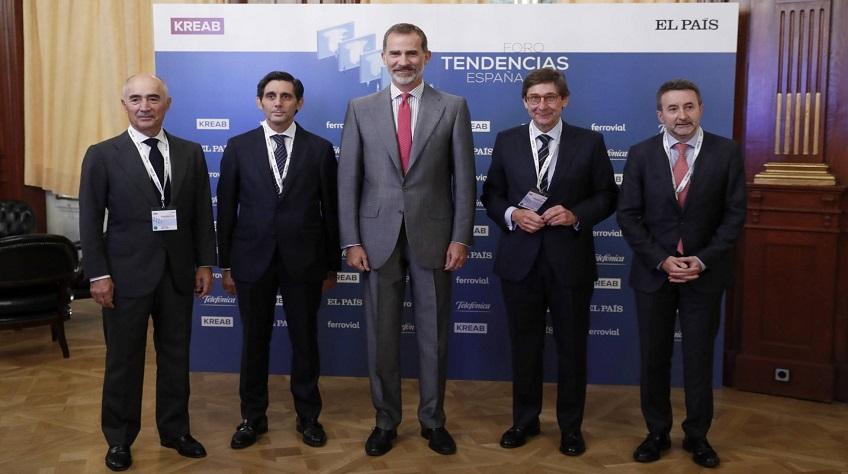News
Foro Tendencias 2019: the trends forum debates key geopolitical and economic issues
28-09-2018

Telefónica, Repsol, Bankia and Ferrovial, four of the largest Ibex companies, believe that any risks to Spain’s economic growth are more likely to be external than internal, such as the wave of protectionism unleashed by the United States, the rise in interest rates and uncertainty surrounding Brexit.
This is the opinion shared by José María Álvarez-Pallete, CEO of Telefónica, José Ignacio Goirigolzarri, Chairman of Bankia, Josu Jon Imaz. Chief Executive Officer of Repsol and Rafael del Pino, Chairman of Ferrovial, who participated on Thursday morning at the Foro Tendencias España 2019 Trends Forum, organized by EL PAÍS and KREAB consultancy, and sponsored by Ferrovial and Telefónica. The debate was attended by King Felipe VI.
According to Pallete, Spain has done its homework following the crisis both in terms of the reforms carried out in the legislative sphere and the internal measures adopted by companies to increase competitiveness, which has led to economic growth above the EU average.
Nevertheless, the Telefonica executive cautioned that although the Spanish economy is prepared for a slowdown "we must be vigilant if we are to avoid losing everything that’sbeen achieved", before insisting that reforms must be kept in place and that "stability and legal predictability" be maintained.
Imaz agreed with his counterpart at Telefonica in predicting that the risk factors for growth are likely to come from abroad, singling out the rise in interest rates in the United States and European Central Bank (ECB) policy, but suggested that we might benefit from less talk of a potential economic slowdown lest this become "a self-fulfilling prophecy".
The Repsol CEO stressed that even if Spaniards may not think so, Spain "is a reliable country" for investors, as can be seen from the example of the multinational itself in its day to day business, since it is present in 28 countries. However, he said that the country must not rest on its laurels and that it must not cease "improving things." "We should not go from self-flagellation to complacency," he concluded.
Both Pallete and Rafael del Pino described as "surprising" the uncertainty that exists around Brexit, with details of the Brexit deal still unknown as the UK’s deadline for departure from the EU approaches.
Del Pino recognised that Spanish companies "have improved a lot in recent years" and are competitive. "We have to preserve what gives us our competitiveness," he added, while urging the government to support the development of companies abroad, by "trying not to erect fiscal barriers."
INNOVATION AND THE FUTURE
Another debate at the Trends Forum was dedicated to Innovation and the Future. Here, Daniel Carreño, CEO of General Electric Spain and Portugal, explained how, for the first time, technology has become "distinctive" and how, at this early stage, "it defies predictability", because it’s growing at an exponential rather than linear rate.
"There are new manufacturing models that favor distributed manufacturing and this will change the rules of the game," said the executive, who added that digitization is leading to one of the greatest revolutions in history, with no activity or sector remaining untouched.
The Chairperson of HP Spain and Portugal, Helena Herrero, was convinced that "everything that can be automated will be automated", because it is not a choice but an unstoppable process -- although she warned that 80% of the CEOs of large companies do not know how to tackle the digital transformation.
The CEO of Iberdrola Spain, Angeles Santamaría, said that Spain needed to invest around 70 billion euros in increased production and smart networks so that by 2030 renewable resources account for 32.5% of end-user consumption. "The consumer does not want to be just a consumer, he or she also wants to be a producer.We are looking at a network of users with dual roles."
It may interest you



